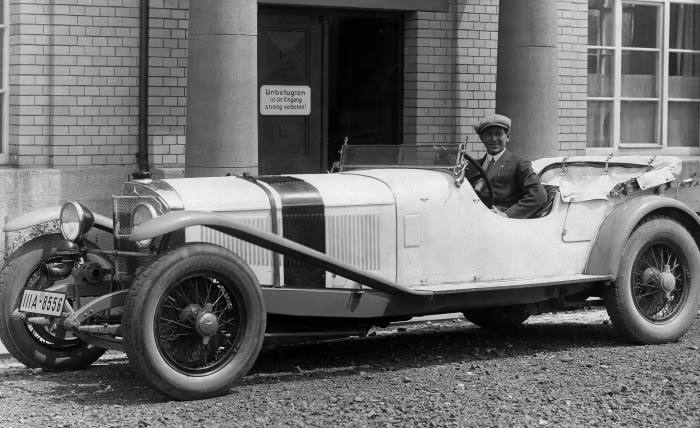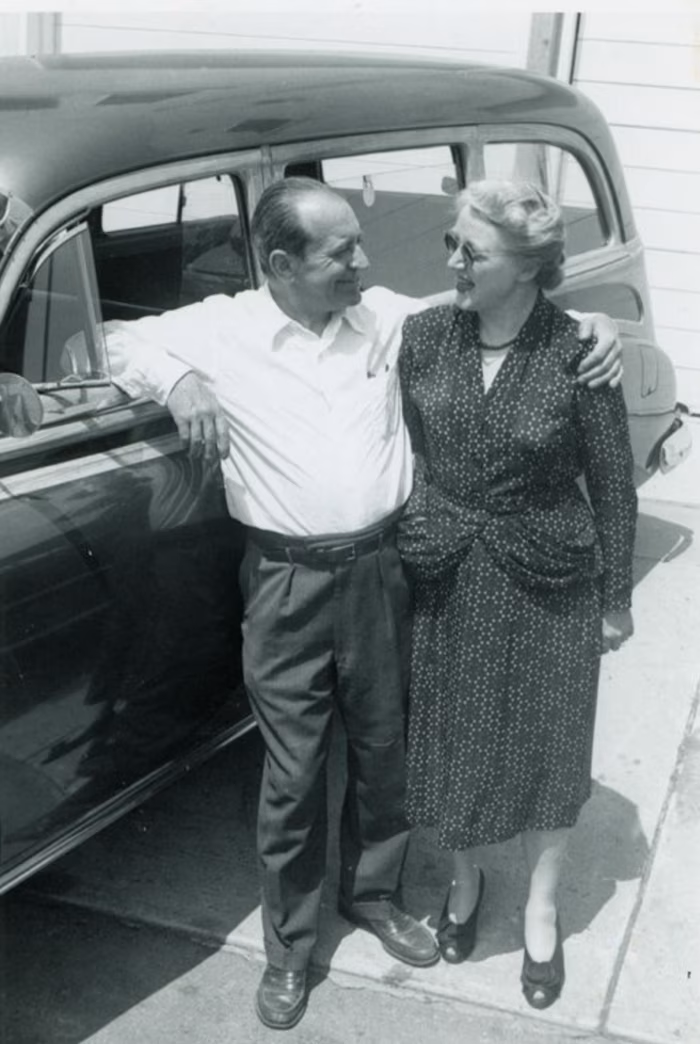News:
Porsche reckons with history of forgotten Jewish co-founder
Patricia Nilsson in Munich
Relative driving recognition campaign says legacy of industrialist Holocaust survivors should be revisited
Porsche’s 75th anniversary extravaganza this summer included a frenzy of sports cars whizzing around its Stuttgart headquarters in front of an audience including heirs to co-founders Ferdinand Porsche and Anton Piëch.
But although the marque’s first car was produced in 1948, the company that made it was formed 17 years earlier and had a third co-founder, Adolf Rosenberger, who gave up his role and stake before fleeing Nazi Germany and remains largely absent from the famed brand’s corporate history.
“My family is not unique,” said Rosenberger’s second cousin Sandra Esslinger, explaining that she had been contacted by descendants of other Jewish German industrialists who escaped the Holocaust, many of whom like Rosenberger died unrecognised overseas while their former businesses flourished in postwar Germany.
Esslinger’s goal is to support other Jewish families whose ancestors play small roles if any in the official histories of companies they helped build — but the first step is seeking justice for her own.
Rosenberger, born in 1900 in the south-west German town of Pforzheim, was a racing driver for what is now Mercedes-Benz when he met Ferdinand Porsche. He helped fund Porsche, taking a 10 per cent stake in the company — the same as Piëch, Ferdinand Porsche’s son-in-law — and served as the company’s managing director.
The luxury car brand has recognised Rosenberger as a co-founder of the company along with Porsche and Piëch, whose descendants now control both Porsche and Volkswagen, with a stable of brands from Audi to Lamborghini.  Adolf Rosenberger in a Mercedes-Benz model ‘S’ in 1927. Rosenberger was a racing driver when he met Ferdinand Porsche
Adolf Rosenberger in a Mercedes-Benz model ‘S’ in 1927. Rosenberger was a racing driver when he met Ferdinand Porsche
But the exact circumstances under which Rosenberger transferred his shares to Ferdinand Porsche’s son at far below their full value in 1935 — the same year he was sent to a concentration camp because of his relationship with a gentile woman — as well as his postwar correspondence with co-founders Porsche and Piëch and their ancestors, are only now being investigated by the company.
The research project was commissioned jointly last year by Porsche and the Adolf Rosenberger non-profit that Esslinger founded, which had contacted the company outlining “some issues” with the portrayal of Rosenberger in a recent corporate biography.
Porsche said last year that the study, due to be published next year, would “for the first time” take into account documents held by the Rosenberger family.
It will be too late for Rosenberger, who told journalists before he died in 1967 that he had unsuccessfully sought to re-enter the company after the war and that his co-founders used the fact he was a Jew “to get rid of me cheaply”.
The company told the Financial Times that “researching and coming to terms with history” was an ongoing process both for it and parent company Volkswagen, adding that they “fully support research into their past”. The Adolf Rosenberger non-profit declined to comment.
The company said Rosenberger was not “hidden” in Porsche’s corporate history, pointing among other things to a plaque among several “team members” at the company’s official museum in Stuttgart, which named him as a “co-founder, shareholder and financier [and an] essential source of support in the early days”.
The plaque, which was installed two years ago, goes on to say that Rosenberger quit his managerial role at the company in 1933 — the year Adolf Hitler came to power — for “economic reasons” and adds that the Jewish businessman only received the initial capital he had put into Porsche when he “withdrew as a partner” two years later.
While civil society in Germany has been praised for its willingness to acknowledge the horrors committed by the Nazi regime, the wartime behaviour of some of the country’s richest industrial families remains a sensitive topic.
The account of Porsche’s history told at its 75th anniversary began in 1948, when Ferdinand Porsche’s son Ferry — to whom Rosenberger transferred his shares — designed the first Porsche-branded sports car, although Porsche has stated that “the groundwork for the company was laid in the design office of Professor Ferdinand Porsche”.
Porsche said Wolfgang Porsche and Hans-Michel Piëch — descendants of the co-founders who sit on the supervisory boards of Volkswagen and the family’s holding company — had “neither denied nor glossed over the involvement of their ancestors or their companies in National Socialism”.
“Essentially, both gentlemen state that they only became fully aware of the involvement of their family and their companies over the course of their lives [and] even if they bear no personal guilt, they are aware of their special responsibility for the past of their family members and their companies,” the company said.
Rosenberger, who in the US changed his name to Alan Robert, died weeks after the birth of Esslinger, who said his story was kept alive by his wife Anne Junckert and the documents held by the family.  Adolf Rosenberger and his wife Anne Junckert, who kept alive his story after he died
Adolf Rosenberger and his wife Anne Junckert, who kept alive his story after he died
While Esslinger said Junckert had at one point served as Ferdinand Porsche’s secretary, the company argued that her exact role was one of the questions under academic review.
The circumstances under which Rosenberger left the company and requests for a review of the matter by the non-profit both hung over the company’s €75bn listing last year.
In its prospectus, Porsche outlined that its brand risked being dented “for historical reasons” stating that “it is possible that the outcome [of the independent review] could reflect negatively on Porsche and its founders, and adversely affect the Porsche brand”.
It also said the company had reached a settlement with Rosenberger in 1950 after he sought compensation “because he was of the opinion that he had to leave Porsche because of his Jewish faith”.
While the descendants of Porsche and Piëch were among the main beneficiaries of Porsche’s initial public offering, Rosenberger’s family have no legal claims to financial compensation after the settlement in 1950, in which Rosenberger was granted 50,000 Deutsche mark, roughly equivalent to €165,000 today, and the choice of a Volkswagen Beetle or a Porsche 356. Rosenberger chose the Beetle.
Rosenberger “was actively being forgotten” during his lifetime, said Esslinger, adding that she was relieved his side of the story was being studied independently. “He lost so much,” Esslinger said, explaining that beyond family, homeland, culture and property, Rosenberger “lost his story”.


